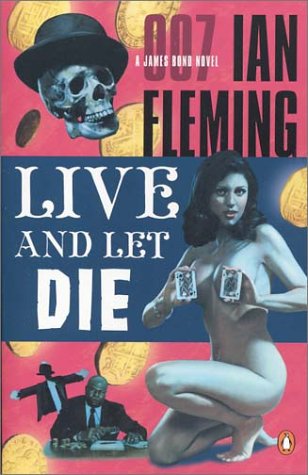I also noticed there are a few really amazing passages in this book that make you think.. like in a literature way
Anyway, I could talk about this novel all day, I really really love it
Posted 22 August 2006 - 01:51 PM
Posted 22 August 2006 - 02:01 PM
Posted 22 August 2006 - 02:37 PM
 - we're reading and reviewing Ian Fleming's Live and Let Die - not Live and Let Die the movie.
- we're reading and reviewing Ian Fleming's Live and Let Die - not Live and Let Die the movie.
Posted 08 September 2006 - 04:47 AM
Posted 18 September 2006 - 01:34 AM
Posted 18 September 2006 - 09:18 PM
Edited by Captain Grimes, 18 September 2006 - 10:32 PM.
Posted 29 September 2006 - 07:59 AM
Posted 30 April 2007 - 07:03 PM

Edited by forever bond, 30 April 2007 - 07:12 PM.
Posted 19 May 2007 - 02:28 PM
Posted 19 May 2007 - 03:28 PM
Posted 19 May 2007 - 10:03 PM
Posted 21 May 2007 - 10:35 PM
Terrific novel. Highly readable. I remember picking it up years ago when I was in high school, and still just getting into the Fleming craze that has now consumed in head to toe. Anyway, I couldn't put the book down when I read it. Some of Fleming's best descriptive travel sequences permeate the text, and the characters are some of the greatest in the canon. The Leiter and Bond friendship really blossoms in this book, and we understand how Bond is easily driven forward in his quest against Mr. Big after what is done to Leiter. An exciting, fast-paced book which has seen a bit of justice done to it over the course of three separate films.
Posted 22 May 2007 - 03:51 AM
Posted 05 June 2007 - 05:04 PM
Posted 09 July 2007 - 08:55 PM
Posted 14 December 2007 - 12:24 AM
Posted 01 May 2008 - 08:45 AM
Posted 31 January 2009 - 06:59 PM
Posted 01 February 2009 - 01:49 PM
Posted 17 May 2009 - 06:20 AM
Edited by Tybre, 17 May 2009 - 06:22 AM.
Posted 30 May 2010 - 11:45 PM